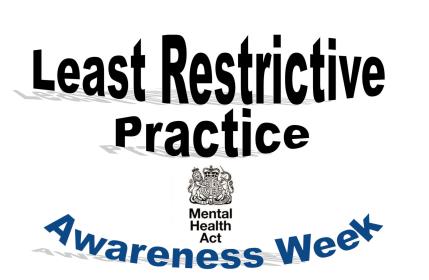Why an ‘awareness week’? Evidence suggests that restrictive practices can be the trigger for flashpoints, causing conflicts and leading to more restrictions which can prolong recovery, increase level of stress (affecting the workforce) and negatively impacting on ‘safety’ and ‘therapeutic’ relationship (Bowers et al, 2014; DoH, 2014; Krug et al, 2002; Paterson et al, 2014). Crucially it impacts negatively on patient experience.
Recent reports (Winterbourne View, 2012; MIND, 2013; Care Quality Commission, 2014) have also highlighted that there is excessive use of restrictive practice within Health and Care services. The Mental Health Act Code of Practice has always emphasised on the use of ‘least restrictive practice’ and promoted individualised patient care. Yet when the CQC looked into ‘blanket restrictions’ during a routine visit between 2012 and 2013 and collated 249 questionnaires completed by ward managers, they (CQC) concluded that such practices have no basis in law or national guidance on good practice. Furthermore a CQC report stated that staff from almost 150 different inpatients services were uncertain about the use of restrictive practice and some of those services were over reliant on its use as a primary approach.
The aim of the awareness week programme was therefore to:
- Create and sustain the awareness of what constitutes restrictive practices.
- Explore with staff the alternative interventions available e.g. negotiable and non-negotiable boundaries, verbal de-escalation, therapeutic risk taking, etc.
- Boost confidence in talk down techniques and a consistent focus on the therapeutic outcome for service users.
“The awareness week has laid a solid foundation to build on. Discussions with staff have not only identified gaps, it has also highlighted key areas that need addressing so as to empower and support staff across all levels. Action plans will address identified gaps and there will be a regular evaluation process to identify difficulties, support staff and monitor progress.”Abu Idris, Lead PMVA Instructor at Cygnet Hospital Beckton
During the week a series of short workshops took place engaging over fifty staff members with discussions in and around restrictive practices and the negative outcomes it can engender in the clinical environment. Additional 1:1 sessions with staff were organised for those staff who wanted to have a more in-depth discussion about the subject (almost 12 staff in total took this opportunity). Reading reference were also provided, e.g. chapter 26 of the Mental Health Act Code of Practice on ‘Safe and therapeutic responses to disturbed behaviour’.
